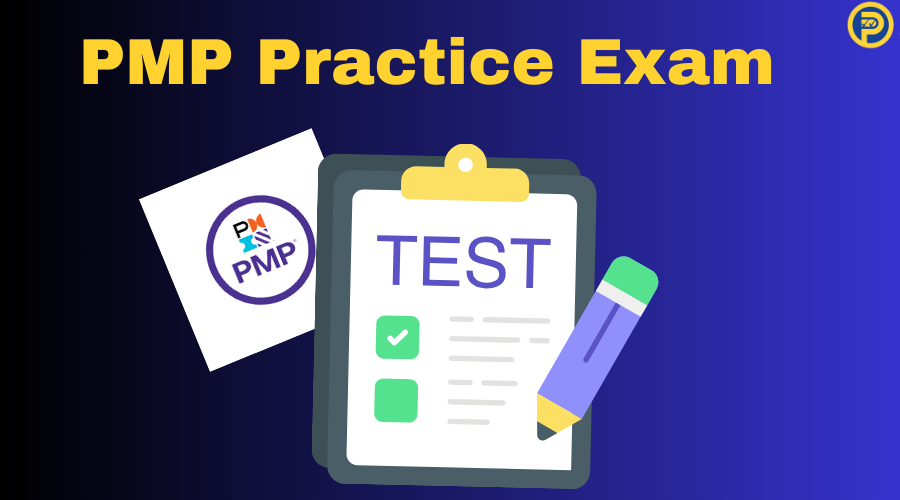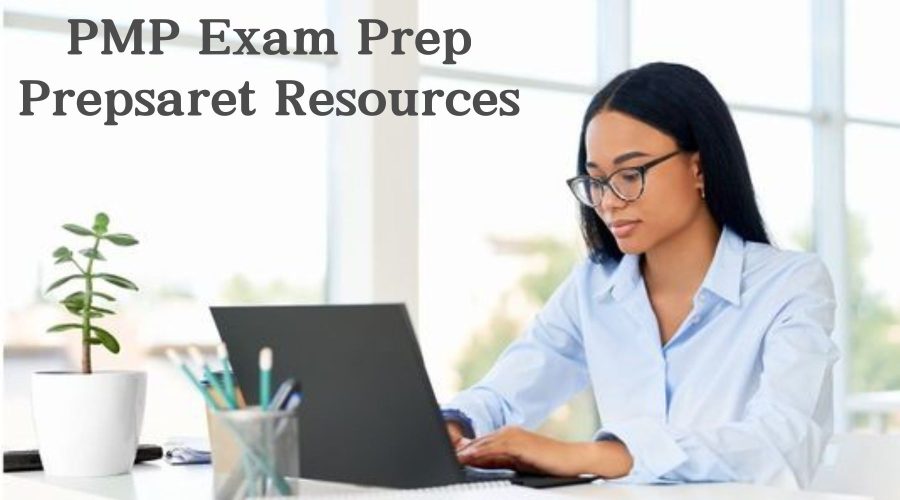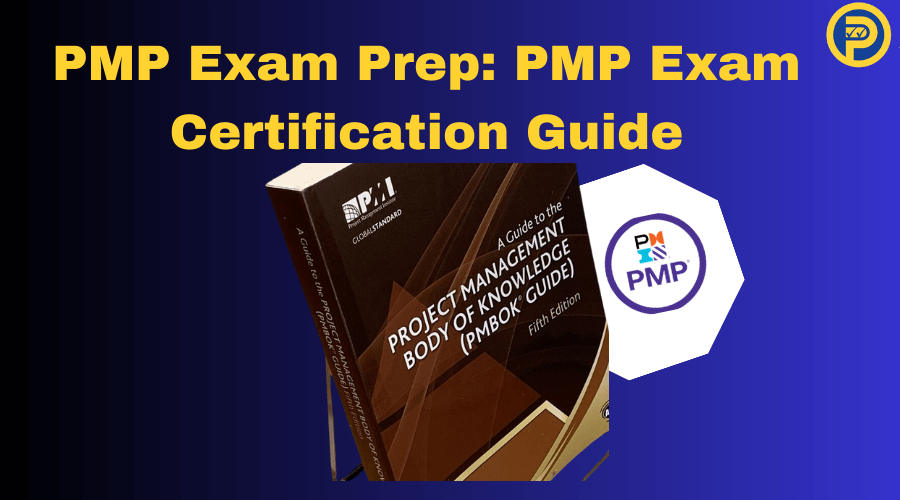If you’re aiming for a thriving career in project management, following the PMP exam prep and PMP exam certification guide can help you earn the Project Management Professional (PMP) certification—a true game changer.
This prestigious credential is more than just a title; it’s a testament to your expertise, commitment, and ability to lead projects to successful outcomes. However, the PMP test isn’t a walk in the park—it demands dedication, strategy, and solid preparation.
That’s where this comprehensive PMP exam prep guide comes in. We’ll cover everything you need to know to ace and pass the PMP and take your project management career to the next level.
What Is a PMP Exam?
The PMP exam, administered by the Project Management Institute (PMI), is a prestigious certification recognized worldwide for project management professionals. This credential demonstrates your ability to manage and lead projects effectively, making it a valuable asset for career growth.
Here’s what you need to know:
- Administering Body: PMI-ACP is responsible for setting the exam standards and frequently updating its content to stay aligned with evolving industry practices.
- Test Format: The test consists of 180 questions, which must be completed within 230 minutes. PMI-ACP doesn’t use a fixed passing score; instead, a psychometric analysis determines whether you meet the competency threshold.
- Question Types: The test features a blend of multiple-choice, drag-and-drop, and scenario-based questions, assessing both your practical skills and theoretical understanding.
Understanding the structure and requirements of the this certification is a crucial first step in your preparation journey. This knowledge helps you focus your efforts, use your study time effectively, and build a study strategy that sets you up for success. Whether you’re new to PMP or refining your prep, knowing what to expect is half the battle won.
Who Is Eligible for the PMP Exam?
The PMP exam is not an entry-level certification test; PMI has specific eligibility requirements to ensure learners have the necessary education and professional experience to succeed.
Educational Requirements
You must meet one of the following criteria:
- If you hold a four-year degree (bachelor’s or equivalent), you’ll need 36 months of project leadership experience.
- Alternatively, learners with a high school diploma or associate degree must demonstrate 60 months of project leadership experience.
Professional Development
In addition to your academic and professional experience, PMI requires candidates to complete 35 contact hours of formal project management education. This can be achieved through training courses, workshops, or even online programs.
Application Process
Once you meet the requirements, you can begin the application. Here’s how:
- Create a PMI Account: Visit PMI.org and sign up.
- Submit Your Application: Provide details about your educational background and project management experience. Be thorough, as PMI may audit your application.
- Pay the Test Fee: PMI members enjoy discounted rates, paying $405 for the test compared to $555 for non-members. Becoming a member costs $139 annually, but the savings often justify the expense.
Total Cost for Members:
- Test Fee: $405
- Membership Fee: $139
- Total: $544 (versus $555 for non-members).
Once your application is approved, you’ll receive instructions on how to schedule your exam at a test center or online site.
Key Steps to Prepare for the PMP Exam
Preparing for the PMP exam takes more than just studying—it requires a clear strategy and focused point. Follow these six steps for success to pass your PMP test:
Step 1: Familiarize Yourself with the PMBOK Guide
The PMBOK Guide is a vital point for PMP exam preparation. It serves as the foundation for understanding core project management principles, key concepts, and terminologies that the exam will test.
- PMP Study Guide: use PMP study guide for preparation. Prioritize key chapters such as integration management, agile methodology, scope management, and risk management, as these areas are heavily emphasized on the exam.
Step 2: Enroll in a PMP Training Course
Taking a formal project management professional training course is essential for understanding complex project management concepts such agile approach and fulfilling the 35-contact-hour requirement.
You have various options to choose from: online courses offer the flexibility to study at your own pace, while in-person classes provide valuable hands-on learning experiences. Whichever format you choose, ensure that the course is accredited and aligns with your learning style to maximize your preparation for the PMP.
Step 3: Develop a Study Plan
A complete review and a well-structured plan are essential to ensuring you fill any knowledge gaps and cover all topics without feeling overwhelmed. Your study plan should be comprehensive yet flexible, designed to fill your preparation with clarity and focus while avoiding burnout. A complete approach is necessary to maximize learning outcomes.
How to Plan:
- Dedicate 2-3 hours daily over 8-12 weeks to study for your PMP exam. Break your study time into focused segments: reading the PMBOK® Guide, taking notes, watching videos, and practicing predictive exam questions with correct answers. For each practice question, review the correct answers thoroughly to understand the reasoning behind them and fill any gaps in your knowledge.
- Consistency is key—commit to independent study and follow a structured, disciplined approach. This will help you build systematic knowledge, and with a detailed review of each topic, boost your confidence and increase your chances of exam success.
Step 4: Use PMP Test Prep Materials and Resources
Selecting the right exam preparation materials is critical to your success. Leverage a combination of free and paid resources to build a comprehensive study strategy. Prepsaret stands out as a top recommendation, offering an online PMP test prep course with extensively curated study materials.
Their resources include easy-to-understand notes that comprehensively cover all exam topics and regularly updated practice test questions with correct answers that mirror the actual PMP exam format. By utilizing high-quality resources like Prepsaret, you can efficiently bridge knowledge gaps, familiarize yourself with exam patterns, and build confidence.
Step 5: Take Practice Exams
Practice exams with detailed explanations are crucial for mastering the project management professional certification test, offering an authentic preview of the actual exam experience. Prepsaret’s high-quality simulated assessments meticulously replicate the real exam’s format, question style, and complexity.

With access to correct answers to these practice test questions, candidates can effectively familiarize themselves with the exam’s structure and practice test itself, monitor study progress and develop critical time management skills.
Benefits of Taking Practice Exams
- Reduces exam anxiety by providing a realistic testing environment
- Helps identify knowledge gaps and weak areas for complete improvement
- Builds confidence by respond to exam-style questions
- Enhances time management skills by practicing under timed conditions
- Provides immediate review and detailed explanations for each question
- Allows learners to track progress and measure readiness
- Simulates the psychological pressure of the actual exam
- Improves question interpretation and critical thinking skills
Step 6: Join a PMP Study and Discussion Group
Project management professionals understand the power of collaboration, and this principle applies perfectly to PMP exam preparation. Joining a study and discussion group can transform your learning journey from a solitary experience to an interactive, supportive community-driven approach.
Participating in PMP study groups provides a dynamic learning environment where candidates can share insights, clarify complex concepts such as agile methodology, and learn from each other’s experiences.
Benefits of PMP Study Groups
- Shared knowledge and diverse perspectives
- Immediate doubt clarification
- Motivation and accountability
- Exposure to different learning techniques
- Emotional support during exam preparation
- Opportunity to practice explaining concepts
- Access to collective resources and study materials such as practice test questions
- Networking with potential professional contacts
By engaging with peers who are also preparing for the project management professional exam, you create a supportive network of learners that can help maintain motivation, provide accountability, and offer emotional support during the challenging preparation period.
Why Prepsaret Is the Best PMP Exam Prep Courses and Resources Site
You can find the top-rated PMP Exam Prep Course and Resources here at Prepsaret! Our complete PMP Prep course is developed with the latest in project management professional principles and is designed to help you pass the PMP exam on your first try.
Dive into our expert-curated courses bursting with engaging content and practical exercises, crafted to boost your confidence and knowledge.
Our PMP Exam Prep Course comes in flexible options – from individual study guides and practice test questions to comprehensive boot camps – ensuring you find which course is the perfect fit for your learning style. We also provide free PMP practice test questions for you.

With personalized support and access to cutting-edge course materials, we have everything you need to achieve PMP certification success. Plus, with easy access and quick onboarding, you’ll start your PMP prep journey in no time. Start today at Prepsaret – your PMP success story awaits!
Paid vs. Free PMP Exam Prep Resources
Both paid and free practices have their place in your study arsenal. Here’s a breakdown:
Pros & Cons of Paid PMP Exam Prep Resources
Pros
- Comprehensive Content: Covers all exam topics in depth.
- Professional Guidance: Access to instructors for personalized support.
- Practice Test: Access to high-quality practice test questions for exam readiness.
- Structured Learning: Access to organized materials for efficient study.
- Updated Content: Aligns with the latest exam standards.
Cons
- Cost: Can be expensive, especially to access this premium course.
- Time-Intensive: Requires a significant time commitment.
Pros & Cons of Free PMP Exam Prep Resources
Pros
- Cost-Effective: Completely free or minimal cost.
- Wide Availability: Resources like YouTube tutorials and blogs are abundant.
- Community Support: Forums and study groups for peer learning.
- Flexibility: Learn at your own pace.
- Introductory Learning: Great for foundational knowledge.
Cons
- Quality Variability: Not all free resources are accurate or up-to-date.
- Limited Depth: May not cover all exam topics comprehensively.
Tips and Strategies for Acing the PMP Exam
Passing the PMP exam requires more than just knowledge—it demands a strategic approach that combines thorough preparation, smart test-taking techniques, and mental resilience. Your success hinges not just on what you know, but how you apply that knowledge under pressure.
Time Management During the Exam
Time is your most critical resource during the PMP exam.
- Develop a precise strategy by allocating approximately one minute per question, totaling 230 minutes for 200 questions.
- Start by quickly scanning the entire exam, tackling easier questions first to build confidence and momentum.
- Flag challenging questions for later review, ensuring you don’t get stuck and lose valuable time.
- Create a mental map of your exam progression, always keeping an eye on the clock without letting it create unnecessary stress.
Memorization Techniques
- Transform complex project management concepts into memorable insights using proven memorization strategies.
- Develop powerful mnemonics for process groups and knowledge areas. The PMBOK process grid should become your visual roadmap—practice drawing it repeatedly until it becomes second nature.
- Create mental associations, use color-coded notes, and develop storytelling techniques that link different project management concepts.
Conquering Exam Anxiety
Test anxiety can derail even those candidates who are ready for the test. Implement a complete approach to managing stress:
Before the Exam:
- Practice deep breathing and meditation techniques
- Get adequate sleep
- Prepare all materials the night before
- Eat a balanced, nutritious meal
- Arrive at the test center early
During the Exam:
- Take deliberate, short mental breaks
- Use positive self-talk
- Maintain steady, controlled breathing
- Remind yourself of your preparation
Common Mistakes to Avoid in PMP Exam Prep
Many aspiring project management professionals unknowingly sabotage their success by falling into common preparation traps that can significantly reduce their chances of passing the exam.
- Over-Reliance on a Single Resource: Limiting your study materials to just one book or platform restricts your understanding and exposure to diverse perspectives on project management concepts. Successful candidates leverage multiple resources, including online courses, practice tests, study guides, and interactive learning platforms.
- Skipping Practice Exams: Mock tests are not optional—they’re essential. These practice exams help you understand the exam format, improve time management skills, identify knowledge gaps, and build confidence. Candidates who consistently practice with full-length exams are significantly more likely to pass on their first attempt.
- Underestimating the PMBOK Guide: The Project Management Body of Knowledge (PMBOK) Guide is the foundational text for the PMP exam. Treating it as a mere reference instead of a comprehensive study resource can lead to incomplete understanding of project management methodologies and reduce your chances of exam success.
Real-Life Success Stories: How PMP Exam Prep Made a Difference
Sarah’s Story: Sarah, a project manager from New York, credits her PMP certification for a 20% salary hike and landing her dream job. Her advice? “Practice tests were my secret weapon!” Her story inspires others to prioritize structured preparation and practical tools. Sarah’s achievement underscores the value of PMP certification as a catalyst for career advancement, offering both financial rewards and professional fulfillment in the competitive project management field.
Davies’ Journey: Davies, a project manager from Canada, faced challenges preparing for the PMP exam but refused to give up. Initially overwhelmed, he discovered a study group that transformed his learning experience. “The collaborative learning made all the difference,” Davies explains, crediting the group’s support for keeping him motivated and accountable. Engaging in discussions and sharing resources helped him overcome obstacles and grasp difficult concepts.
FAQs
How to Prepare for PMP Certification?
To study for PMP certification, create a structured study plan that includes reviewing the PMBOK® Guide, taking practice exams, and attending training courses. Aim for at least 35 contact hours of formal education in project management.
Regularly assess your progress through mock tests to identify areas needing improvement.
Is 70% Enough to Pass PMP?
No, there is no fixed passing score for this certification exam. Each candidate receives a unique set of questions with varying difficulty levels, meaning the passing score can differ. Candidates should aim for a high level of understanding and practice consistently to improve their chances of success.
How to Get 35 PDUs for PMP Certification?
To earn 35 PDUs (Professional Development Units) for PMP certification, you can attend accredited training sessions, workshops, or online courses focused on project management topics.
Many organizations offer courses specifically designed to meet this requirement, ensuring you gain valuable knowledge while fulfilling the PDU criteria.
Does Google Project Management Certificate Count for PMP Hours?
The Google Project Management Certificate can count toward the required hours for the exam if it includes formal project management education. However, ensure that the course meets PMI's criteria and provides at least 35 hours of instruction to qualify for eligibility.
What Is the Most Challenging Part of the PMP Exam?
The most challenging part of this certification test is often managing time effectively during the test. Candidates have 230 minutes to answer 180 questions, which requires quick thinking and comprehension.
Additionally, many struggle with situational questions that test the practical application of project management concepts in a business environment.
How Do I Prepare for the PMP Exam?
To study for the test, familiarize yourself with the PMBOK® Guide and create a detailed study schedule. Incorporate practice tests with detailed explanations into your routine and focus on areas where you feel less confident. Joining study groups can also provide support and enhance your understanding through discussion.
Is the PMP Exam Hard?
Yes, the PMP test is considered challenging due to its comprehensive nature and time constraints. Approximately 80% of candidates fail on their first attempt, underscoring the need for thorough preparation and effective study strategies to succeed.
Can I Self-Study for the PMP Exam?
Yes, you can self-study for the exam by utilizing resources like the PMBOK® Guide, online courses, and practice exams. However, self-discipline and a structured study plan are crucial to ensure comprehensive coverage and review of all necessary topics.
What Is the Best Way to Prepare for PMP?
The best way to prepare for the exam involves creating a study plan that includes reviewing key concepts from the PMBOK® Guide, taking practice exams regularly, and attending formal training courses if possible. Engaging in discussions with peers can also enhance understanding.
Can You Pass the PMP Exam in Three Weeks?
While it's possible to pass the PMP exam in three weeks with intensive study, it requires a focused approach and prior knowledge of project management principles. Candidates must dedicate significant daily hours to studying and practicing mock exams during this short timeframe.
Can You Self-Study for the PMP Exam?
Yes, self-studying for the PMP exam is feasible with proper resources such as books, online courses, independent study, and practice tests. However, successful self-study requires strong motivation and a well-structured study plan to cover all necessary material effectively.
PMP Exam Prep: Your Ticket to PMP Certification!
Achieving this certification requires structured and thorough preparation, but the rewards are well worth the effort. A solid study plan, practice exams, and support from resources like study groups can make all the difference.
Diligent preparation not only boosts your confidence but also ensures you’re ready to tackle the exam and excel in your project management career. Start your PMP journey with determination and the right tools at your side.
With focus and persistence, you can unlock exciting opportunities and professional growth. Take the first step toward certification success today!

